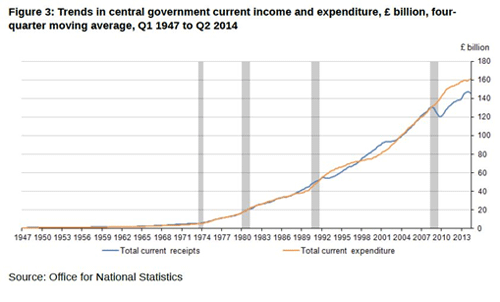It’s bad news for George Osborne. Why? The longer that UK rates stay at historic lows, the more likely it is that the economy isn’t growing to its potential. And if that’s happening, then Osborne’s Budget numbers get thrown to the dogs as tax receipts he’s counting fail to materialise. More deficits.
The chancellor copped it yesterday for failing to deliver on one of his key pledges. He’d vowed to systematically reduce British debt as a percentage of GDP. Not even a sugar tax that will generate around £520 million pounds can repair the hole that’s been blown in his Budget. The sugar tax, by the way, is ridiculous. What business does the government have telling people how much sugar they can put in their body?
Leaving dietary principles aside, the point I made earlier in the week is worth revisiting in picture form. You can see it below. Beginning in 1974 – at around the same time the world went on the unbacked US dollar standard – the British government has taxed and spent more year after year. Since the crisis in 2008, spending has consistently been higher than “receipts” even as receipts climb as well.
Government gets bigger. Spending goes up. Deficits get larger. The debt grows. Such is life in the modern welfare state. As John Butler pointed out on the podcast, the gold standard is disliked by central planners because it keeps the state honest. And what state wants to be fiscally honest? Or use honest money? Not many. Any?
Category: Economics


